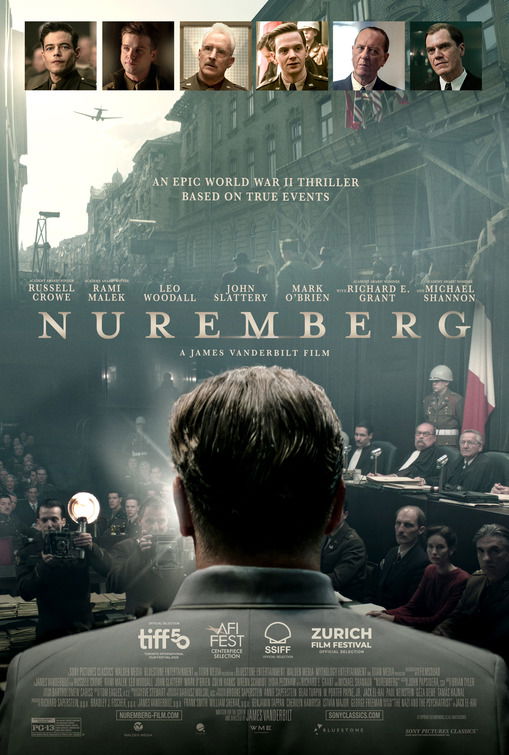“Absolute Power Corrupts Absolutely”

| None | Light | Moderate | Heavy | |
|---|---|---|---|---|
| Language | ||||
| Violence | ||||
| Sex | ||||
| Nudity |
What You Need To Know:
NUREMBERG is impeccably staged, directed and acted. It tells a gripping drama about exposing the horrific evil that lurks within the human psyche. Also, it concludes that absolute power corrupts absolutely. However, the movie shows disturbing images from the Holocaust that were shown at the trial and helped convict Göring and the others, though not everyone was hanged. NUREMBERG also has 12 obscenities and six strong profanities. So, MOVIEGUIDE® advises strong and extreme caution, though NUREMBERG is a superb piece of dramatic entertainment.
Content:
Strong moral worldview about the biggest of the Nuremberg Trials of Germany’s National Socialist leaders and their evil regime led by Hitler from 1933 to 1945, so movie has very strong elements against such totalitarian evil and displays strong support for America, Western values of biblical morality and jurisprudence, but the main character is a secular psychiatrist who doesn’t consciously base his conclusions on Christian or biblical values (though, like all secular-minded people, he must borrow from them);
12 obscenities (including one “f” word by an extremely angry and distraught, psychopathic National Socialist leader as he’s woken up to get ready to face the hangman after being convicted of war crimes), four strong profanities using the name of Jesus Christ, two GD profanities, and an American soldier urinates on a Swastika on the side of the road before a fancy car pulls up, and it turns out to be the former second in command to Adolf Hitler surrendering to the Americans in 1945;
Strong images of dead bodies and emaciated people from the Holocaust in footage shown at the Nuremberg Trials in 1946;
No sex;
Upper and rear nudity of naked victims of the Holocaust in historical film footage;
Some alcohol use;
Smoking and the leading National Socialist under Hitler turns out to be addicted to paracodeine, a European opiate he used in copious amounts to deal with pain from a groin wound he suffered during the attempted coup Hitler and he led against the German government in 1923; and,
The evil National Socialist leaders on trial in the movie range from raving lunatics to cold and calculating, though often charming (in a devious sort of way), and there are some ethical issues in some of the actions of the Chief Counsel for the United States in the trial.
More Detail:
The movie opens with the news that Adolf Hitler, the demonic leader of Nazi Germany who ravaged Europe with his deadly war machine, has killed himself. Meanwhile, President Truman appoints Supreme Court Justice Robert H. Jackson to be Chief U.S. Counsel for the prosecution of German war criminals. Jackson faces a daunting task: On what possible legal basis can you prosecute someone for war crimes? Also, how do you get Russia’s international socialist leaders to agree to it, especially since it’s clear that, unlike the United States, England and France, Russia and its ruthless leader, Joseph Stalin, has no democratic criminal justice system, but has an authoritarian system that’s much like that of Hitler’s Germany (Paul Johnson writes in his great historical book, MODERN TIMES, that Hitler borrowed some of his authoritarian techniques from Russia’s communist leaders, who had seized total power in 1917).
Shortly after Hitler’s death, Hitler’s former second in command, Hermann Göring, surrenders to American forces. The movie’s first scene shows Göring getting out of a big black fancy car and surrendering to American troops.
The Allied forces place Göring in with 20 other high-ranking National Socialist leaders under Hitler, including Admiral Donitz, who replaced Göring when Hitler thought Göring was trying to stage a coup in April 1945, Foreign Minister Joachim von Ribbentrop, the Nazi Party ideologue Alfred Rosenberg, and Robert Ley, director of Nazi Germany’s new German Labor Front, who threw labor union activists into concentration camps, led the way in abusing foreign slave labor and supported Hitler’s extermination of the Jews (Ley argued in 1939 that, if Britain won the war, the British and the Jews would exterminate the German people, so the Germans might as well start killing the Jews instead).
Since Hitler and other member of his staff, including SS leader Himmler, had committed suicide, Allied leaders are afraid Göring and the other remaining Nazis might decide to do the same thing. So, the Americans bring in three psychiatrists, including Captain Douglas Kelley, a California-born physician specializing in psychology, to evaluate their individual mental state, not only to prevent suicide but also to determine their competency to stand trial.
The movie focuses on Kelley’s interrogation of the Nazi leaders, especially his growing personal relationship with Hermann Göring. Kelley helps Göring survive a sudden heart problem and earns his trust. He also delivers letters from Göring to his wife and daughter. Kelley becomes sympathetic to their plight, however. Even worse, he lets himself be charmed by Reichsmarcshall Göring, a gregarious and ambitious narcissist and drug addict adept at manipulating other people.
The Allies and Captain Kelley had discovered that Göring was strongly addicted to paracodeine, a European opiate he thoroughly abused to deal with the pain he suffered resulting from a groin wound he received in 1923 during the attempted coup Hitler, Göring and other Nazi Party leaders led against the German government. The Allies weaned Göring off most of the pills he daily took, but they couldn’t entirely do it because to do so would have made him a raving lunatic unable to stand trial.
As Kelley began his job analyzing Göring and the other prisoners, Jackson and the other prosecutors build a place to hold their trial, Nuremberg, the city where the Nazi Party held elaborate rallies and developed new racial laws to control Jews and other people they deemed “undesirable.” The Nuremberg Palace of Justice had survived the war reasonably unscathed. Also, it included a large prison complex where the Nazi leaders could be jailed. Russia had finally agreed to participate in the trial, and Jackson and the other prosecutors draft a charter to provide an international legal basis for the trials.
One night, Jackson secretly meets with Kelley to ask him to spy on Göring and the other Nazi prisoners and tell him what their arguments are going to be during the trial. Jackson and Kelley furiously debate the ethics of doing that. Kelley worries that such an action would taint the Allied prosecution of the Nazi leaders as war criminals.
However, as Kelley gets to know how clever, charming and devious Göring is, he begins to believe that Göring will beat Jackson when Göring appears on the witness stand. Thus, Kelley has a real moral dilemma on his hands. Will he figure out a way to solve his dilemma? And, how much does his natural empathy for his patient and his patient’s wife and daughter affect his decision?
NUREMBERG is based on a brilliant book by Jack El-Hai about Kelley’s interactions with Hermann Göring and the 20 other National Socialist leaders on trial. Impeccably staged, directed and acted, it’s a gripping drama about exposing the horrific evil that lurks within the human psyche. The movie shows clearly and strongly that absolute power corrupts absolutely. Ultimately, Kelley himself concludes that any human being can be seduced by the kind of evil the Nazis represent.
Such a conclusion is similar to God’s conclusion in Genesis 8:21, where God tells Noah, “The intentions of man’s heart are evil from his youth.” However, neither Kelley nor the movie makes this connection to God’s doctrine of human evil. Thus, Kelly’s conclusion in the movie NUREMBERG is more of a humanist, psychological conclusion than a biblical or theological one.
Also, the movie doesn’t make any reference to one of Chief Counsel Jackson’s most famous points in his closing arguments that the military tribunal at Nuremberg “seeks guidance not only from International Law but also from the basic principles of jurisprudence which are assumptions of civilization” (see page 26 of THE LAW ABOVE THE LAW by John. Warwick Montgomery, NRP Books, 2015). In other words, as the title of Montgomery’s book attests, there’s a “Law Above the Law,” and that law’s objective, transcendent moral standards come from God and His Word Written, the Bible, and are an essential part of His divine character.
However, a movie is not a textbook or a philosophical treatise. So, the argument against the National Socialists in NUREMBERG is actually an emotional one and rests on the horrible footage of the atrocities that the Nazi leaders committed during the Holocaust in their death camps and their labor camps. That footage is THE primary evidence that condemns them, not only in 1946 but also throughout all of eternity. Thus, NUREMBERG effectively ends with the old legal adage by which our laws and our courts should operate but too often don’t, “The facts win the case.”
NUREMBERG includes the disturbing images from the Holocaust footage played at Göring, Rosenberg, et al.’s trial. There’s also a scene of the Allies hanging the Nazi leaders who received the death penalty. The movie also has some foul language, 12 obscenities and six strong profanities. So, MOVIEGUIDE® advises strong and extreme caution, though the movie is a superb piece of dramatic entertainment.
On a side note, to see how far Captain Kelley may have succumbed to Hermann Göring’s devious charms, there is this note Göring sent to Dr. Kelley as he returned to America: “I regret your departure from Nuremberg, as do the comrades confined with me. I thank you for your human behavior and also for your attempt to understand our reasons.”


 - Content:
- Content: 


